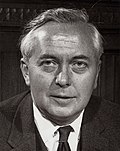15 October 1964 | |||||||||||||||||||||||||||||||||||||||||
All 71 Scottish seats to the House of Commons | |||||||||||||||||||||||||||||||||||||||||
|---|---|---|---|---|---|---|---|---|---|---|---|---|---|---|---|---|---|---|---|---|---|---|---|---|---|---|---|---|---|---|---|---|---|---|---|---|---|---|---|---|---|
| |||||||||||||||||||||||||||||||||||||||||
 Results of the 1964 election in Scotland Conservative/Unionist Labour Liberal | |||||||||||||||||||||||||||||||||||||||||
A general election was held in the United Kingdom on Thursday, 15 October 1964 and all 71 seats in Scotland were contested. [1] [2] The election saw both Labour and the Liberals pick up seats from the Unionists. The National Liberals, who were aligned with the Unionists, lost all their remaining seats.
Contents
Combined with results from across the UK, the election resulted in the Conservative and Unionist Party, led by incumbent Prime Minister Alec Douglas-Home, narrowly losing to the Labour Party, led by Harold Wilson; Labour secured a parliamentary majority of four seats and ended a thirteen-year period in opposition. Wilson became the youngest Prime Minister since Lord Rosebery in 1894.
The election was the last election fought by the Unionists as a separate party. From April 1965 the party was renamed as the Scottish Conservative and Unionist Party, and became the Scottish branch of the UK Conservative Party. [3] [4]


